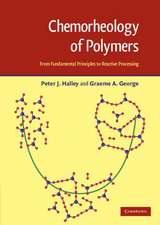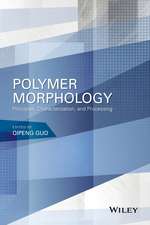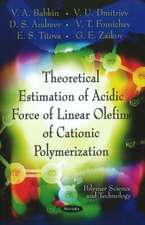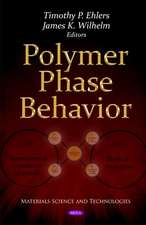Enzyme Kinetics and Mechanism, Part D: Developments in Enzyme Dynamics: Methods in Enzymology, cartea 249
John N. Abelson, Melvin I. Simon Daniel L. Purichen Limba Engleză Hardback – 4 mai 1995
- Mechanisms of enzyme catalysis and inhibition
- Enzyme structure and function
- Regulatory control of enzymes
- Action of catalytic antibodies and ribozymes
Din seria Methods in Enzymology
-
 Preț: 390.52 lei
Preț: 390.52 lei -
 Preț: 391.28 lei
Preț: 391.28 lei -
 Preț: 391.99 lei
Preț: 391.99 lei -
 Preț: 390.99 lei
Preț: 390.99 lei - 28%
 Preț: 801.23 lei
Preț: 801.23 lei - 32%
 Preț: 802.54 lei
Preț: 802.54 lei - 23%
 Preț: 461.36 lei
Preț: 461.36 lei - 23%
 Preț: 460.60 lei
Preț: 460.60 lei - 23%
 Preț: 439.86 lei
Preț: 439.86 lei - 23%
 Preț: 448.15 lei
Preț: 448.15 lei - 23%
 Preț: 451.42 lei
Preț: 451.42 lei - 23%
 Preț: 445.18 lei
Preț: 445.18 lei - 5%
 Preț: 557.15 lei
Preț: 557.15 lei - 23%
 Preț: 450.67 lei
Preț: 450.67 lei - 23%
 Preț: 446.23 lei
Preț: 446.23 lei - 23%
 Preț: 435.87 lei
Preț: 435.87 lei - 23%
 Preț: 445.94 lei
Preț: 445.94 lei - 23%
 Preț: 459.55 lei
Preț: 459.55 lei - 23%
 Preț: 460.02 lei
Preț: 460.02 lei - 23%
 Preț: 450.54 lei
Preț: 450.54 lei - 23%
 Preț: 453.47 lei
Preț: 453.47 lei - 5%
 Preț: 565.37 lei
Preț: 565.37 lei - 23%
 Preț: 450.67 lei
Preț: 450.67 lei - 23%
 Preț: 464.33 lei
Preț: 464.33 lei - 23%
 Preț: 441.49 lei
Preț: 441.49 lei - 23%
 Preț: 447.44 lei
Preț: 447.44 lei - 23%
 Preț: 459.13 lei
Preț: 459.13 lei - 23%
 Preț: 450.38 lei
Preț: 450.38 lei - 23%
 Preț: 445.80 lei
Preț: 445.80 lei - 23%
 Preț: 445.35 lei
Preț: 445.35 lei - 23%
 Preț: 442.53 lei
Preț: 442.53 lei - 23%
 Preț: 450.38 lei
Preț: 450.38 lei - 23%
 Preț: 448.60 lei
Preț: 448.60 lei - 23%
 Preț: 447.57 lei
Preț: 447.57 lei - 23%
 Preț: 440.90 lei
Preț: 440.90 lei - 23%
 Preț: 448.15 lei
Preț: 448.15 lei - 23%
 Preț: 466.84 lei
Preț: 466.84 lei - 23%
 Preț: 451.42 lei
Preț: 451.42 lei - 23%
 Preț: 453.64 lei
Preț: 453.64 lei - 23%
 Preț: 459.13 lei
Preț: 459.13 lei - 23%
 Preț: 457.49 lei
Preț: 457.49 lei - 23%
 Preț: 447.44 lei
Preț: 447.44 lei - 5%
 Preț: 561.34 lei
Preț: 561.34 lei - 23%
 Preț: 447.57 lei
Preț: 447.57 lei - 23%
 Preț: 453.35 lei
Preț: 453.35 lei - 23%
 Preț: 441.95 lei
Preț: 441.95 lei - 23%
 Preț: 450.38 lei
Preț: 450.38 lei - 23%
 Preț: 449.19 lei
Preț: 449.19 lei - 23%
 Preț: 456.02 lei
Preț: 456.02 lei
Preț: 451.71 lei
Preț vechi: 586.64 lei
-23% Nou
Puncte Express: 678
Preț estimativ în valută:
86.43€ • 90.49$ • 71.52£
86.43€ • 90.49$ • 71.52£
Carte tipărită la comandă
Livrare economică 05-19 aprilie
Preluare comenzi: 021 569.72.76
Specificații
ISBN-13: 9780121821500
ISBN-10: 0121821501
Pagini: 662
Dimensiuni: 152 x 229 x 33 mm
Greutate: 1.02 kg
Editura: ELSEVIER SCIENCE
Seria Methods in Enzymology
ISBN-10: 0121821501
Pagini: 662
Dimensiuni: 152 x 229 x 33 mm
Greutate: 1.02 kg
Editura: ELSEVIER SCIENCE
Seria Methods in Enzymology
Public țintă
Biochemists; biophysicists; molecular biologists; physical chemists; pharmacologists; analytical, organic, and medicinal chemists; biotechnologists; and graduate students in these areas.Cuprins
General Approaches to Biological Catalysis:C.A. Fierke and G.G. Hammes, Transient Kinetic Approaches to Enzyme Mechanisms.K.A. Johnson, Rapid Quench Kinetic Analysis of Polymerases, Adenosinetriphosphatases, and Enzyme Intermediates.R.G. Duggleby, Analysis of Enzyme Progress Curves by Nonlinear Regression.B.V. Plapp, Site-Directed Mutagenesis: A Tool for Studying Enzyme Catalysis.Inhibitors as Mechanistic Probes:H.J. Fromm, Reversible Enzyme Inhibitors as Mechanistic Probes.S.E. Szedlacsek and R.G. Duggleby, Kinetics of Slow and Tight-Binding Inhibitors.W.W. Cleland, Kinetic Method for Determination of Dissociation Constants of Metal Ion(Nucleotide Complexes.B.F.Cooper and F.B. Rudolph, Product Inhibition Applications.K.L. Rebholz and D.B. Northrop, Kinetics of Iso Mechanisms.R.B. Silverman, Mechanism-Based Enzyme Inactivators.A. Radzicka and R. Wolfenden, Transition State and Multisubstrate Analog Inhibitors.Isotopic Probles of Enzyme Action:I.A. Rose, Partition Analysis: Detecting Enzyme Reaction Cycle Intermediates.W.W. Cleland, Isotope Effects: Determination of Enzyme Transition State Structure.B.J. Bahnson and J.P. Klinman, Hydrogen Tunneling in Enzyme Catalysis.L.S. Mullins and F.M. Raushel, Positional Isotope Exchange as Probe of Enzyme Action.M.-D. Tsai, R.-T. Jiang, T. Dahnke, and Z. Shi, Manipulating Phosphorus Stereospecificity of Adenylate Kinase by Site-Directed Mutagenesis.F.C. Wedler, Equilibrium Isotope Exchange in Enzyme Catalysis.D.N. Silverman, Proton Transfer in Carbonic Anhydrase Measured by Equilibrium Isotope Exchange.Kinetics of Specialized Systems:J.D. Stewart, I. Lee, B.A. Posner, and S.J. Benkovic, Expression of Properly Folded Catalytic Antibodies in Escherichia coli.K.E. Neet, Cooperativity in Enzyme Function: Equilibrium and Kinetic Aspects.M.K. Jain, M.H. Gelb, J. Rogers, and O.G. Berg, Kinetic Basis for Interfacial Catalysis by Phospholipase A2.Author Index.Subject Index.
Recenzii
Praise for the Series"The Methods in Enzymology series represents the gold-standard." --NEUROSCIENCE
"Incomparably useful." --ANALYTICAL BIOCHEMISTRY
"It is a true 'methods' series, including almost every detail from basic theory to sources of equipment and reagents, with timely documentation provided on each page." --BIO/TECHNOLOGY
"The series has been following the growing, changing and creation of new areas of science. It should be on the shelves of all libraries in the world as a whole collection." --CHEMISTRY IN INDUSTRY
"The appearance of another volume in that excellent series, Methods in Enzymology, is always a cause for appreciation for those who wish to successfully carry out a particular technique or prepare an enzyme or metabolic intermediate without the tiresome prospect of searching through unfamiliar literature and perhaps selecting an unproven method which is not easily reproduced." --AMERICAN SOCIETY OF MICROBIOLOGY NEWS
"If we had some way to find the work most often consulted in the laboratory, it could well be the multi-volume series Methods in Enzymology...a great work." --ENZYMOLOGIA
"A series that has established itself as a definitive reference for biochemists." --JOURNAL OF CHROMATOGRAPHY
"Incomparably useful." --ANALYTICAL BIOCHEMISTRY
"It is a true 'methods' series, including almost every detail from basic theory to sources of equipment and reagents, with timely documentation provided on each page." --BIO/TECHNOLOGY
"The series has been following the growing, changing and creation of new areas of science. It should be on the shelves of all libraries in the world as a whole collection." --CHEMISTRY IN INDUSTRY
"The appearance of another volume in that excellent series, Methods in Enzymology, is always a cause for appreciation for those who wish to successfully carry out a particular technique or prepare an enzyme or metabolic intermediate without the tiresome prospect of searching through unfamiliar literature and perhaps selecting an unproven method which is not easily reproduced." --AMERICAN SOCIETY OF MICROBIOLOGY NEWS
"If we had some way to find the work most often consulted in the laboratory, it could well be the multi-volume series Methods in Enzymology...a great work." --ENZYMOLOGIA
"A series that has established itself as a definitive reference for biochemists." --JOURNAL OF CHROMATOGRAPHY










